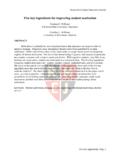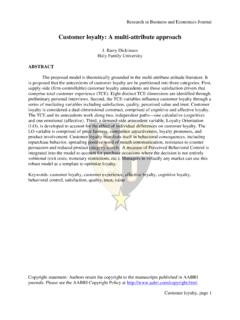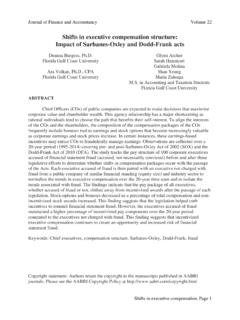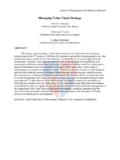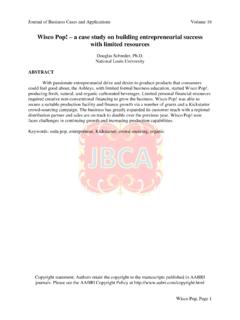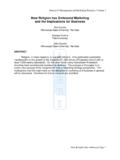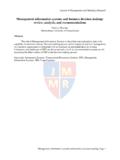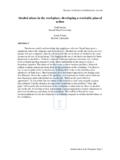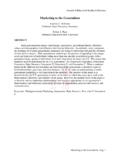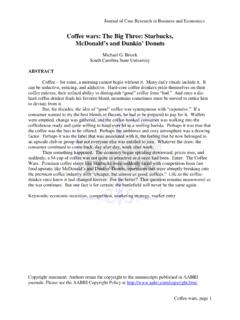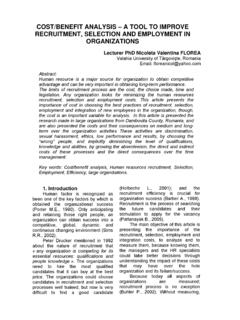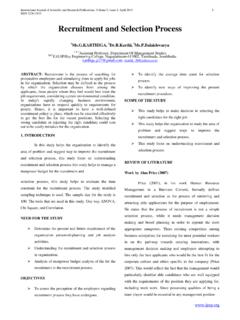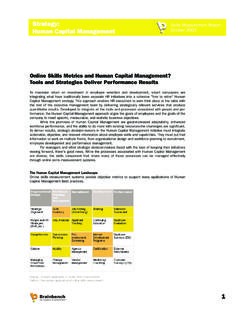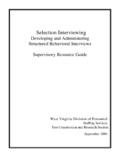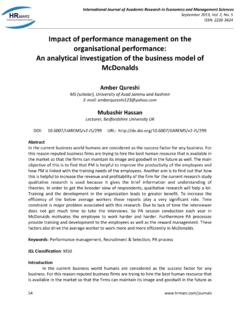Transcription of Grounded theory: Its use in recruitment and retention
1 Journal of Management and Marketing Research Grounded theory : Its use, page 1 Grounded theory : its use in recruitment and retention Jamye E. Long Delta State University ABSTRACT Understanding the methodology of Grounded theory can assist researchers in expanding the knowledge and application of the human resource management practices of recruitment and retention beyond the bounds of traditional theories and methodologies. This paper encompasses research in which Grounded theory , when applied to workforce management, provides insight into the challenges of recruiting and retaining healthcare professionals, specifically those in rural areas faced with obstacles not experienced in most urban settings.
2 Through interviewing healthcare professionals, analyzing the collected data using Grounded theory , and interpreting the results, organizations can gain a better understanding of the needs, wants, and demands of employees in the healthcare industry. Conclusions address the use and role of Grounded theory in better understanding and managing employees. Keywords: Grounded theory , recruitment , retention , Workforce management, Human resources management Copyright statement: Authors retain the copyright to the manuscripts published in AABRI journals. Please see the AABRI Copyright Policy at Journal of Management and Marketing Research Grounded theory : Its use, page 2 INTRODUCTION Human resource professionals derive their practices from previously conducted research that has yielded numerous theories.
3 Practitioners utilize those theories to implement strategies designed to best manage their workforces. The success of this rests on selecting the proper approach to the research process, thus leading to the appropriate methodology and overall framework from which results will be derived. This forms a basis for determining the knowledge needed by organizations to recruit and retain qualified talent. In order to determine new understandings of workforce issues, the most desirable approach allows the researcher to develop theories based on the data collected, a process referred to as inductive analysis, as opposed to traditional methodology techniques of basing data on previously existing theories (Patton, 2002).
4 The methodology of Grounded theory , which primarily uses inductive analysis, is qualitative, meaning it is an open approach to research (Bowen, 2006). The benefits of applying Grounded theory include the freedom allotted to the interviewee in speaking freely without constraints that can be found in traditional data collection and analysis methods. This freedom permits the interviewer to follow the path provided by the interviewee (Ghezelijeh & Emami, 2009). This technique leads to the establishment of new theories and the combination of existing theories which explain the occurrences being studied and allow for appropriate changes in strategies, practices, and techniques in the field.
5 UNDERSTANDING Grounded theory A product of the 1960s, Grounded theory centers on the idea that existing theories do not completely explain the incidences occurring in a situation. Given this, Grounded theory provides an open approach to research. Using this methodology, the theory or theories responsible for the occurring situations are developed through the interview process designed to allow the progress of the information and the interviews to be managed by the interviewer. Grounded theory allows the interviewer to freely follow the interview s path by allowing participants to speak openly in response to questions (Corbin & Strauss, 2008). The lack of rigid structure aids in the development of new knowledge and comprehension of the underlying occurrences driving the situation being studied.
6 This method of data collection allows one to build a more complete understanding of the direction of the research and foresee possible points of interest that could be critical to the outcome of the study (Ghezelijeh & Emami, 2009). This leads to the creation of new theories and the combination of existing theories. Grounded theory , as described by Corbin and Strauss (2008), is used to analyze research questions, and it aids in the collection, interpretation, and understanding of collected data for research. According to Strauss and Corbin (1990) and Kara (2005), there are seven primary characteristics of research applicable to using Grounded theory .
7 Those characteristics are: 1. Grounded theory assumes that there is an issue which needs to be researched. 2. The aim is to build theory that is faithful to and helps explain this issue. 3. Research question(s) have to be flexible and free enough to explore the issue in depth, and should gradually become narrower during the research process, but they should not become so narrow that they block the possibility of further discovery. Journal of Management and Marketing Research Grounded theory : Its use, page 3 4. Grounded theory is cumulative: analysis begins at the start of the research project, and data collection, analysis and theorizing run alongside each other throughout the research process.
8 5. Grounded theory tends to be orientated towards practical action rather than towards abstract ideas. 6. In order for theory to be Grounded , it must have: Fit: does it fit the issue being researched? Understanding: does it make sense to both service users and service providers? Generality: is the theory sufficiently abstract to make it applicable to the issue being researched in different contexts? Control: does the theory provide a framework for action to achieve change in the issue being researched? 7. The process of developing the Grounded theory must be theoretically sensitive . This refers to a personal quality of the researchers, defined as the ability to recognize what is important in data and to give it meaning (Strauss and Corbin, 1990, as cited by Kara, 2005, 3).
9 Knowing the characteristics of Grounded theory assists with one s understanding of the application of this methodology in research. Others provide insight into the methodology as it relates to the choice to use Grounded theory and the benefits this process provides. As stated by Kara (2005), Grounded theory is a scientific discipline which is also very creative. Alternating between collecting and analyzing data requires both creativity and scientific rigour ( 5). Barker, Jones, Britton, and Messer ( ) add that Grounded a single, unified, systematic method of analysis (Selection of a qualitative methodology, 2). Grounded theory is an established methodology that has been used by researchers in numerous fields.
10 In business, it allows new points of views and understanding of the context and practices of working professionals. Petrini and Pozzebon (2009) discuss Grounded theory s role in exploring the use of technology, specifically how business intelligence systems is used as a strategy leading to organizational sustainability. Ardichvili, Michell, and Jondle (2009) researched the qualities exhibited by business cultures considered ethical in an effort to determine how to build sustainable ethics practices. Another example of business research utilizing Grounded theory is that of Palka, Pousttchi, and Wiedemann (2009), in which the authors examined the common practice of marketing using mobile devices.
